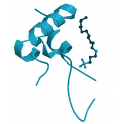
- Remove this product from my favorite's list.
- Add this product to my list of favorites.
Products
Newsletter
 |  |  |  |  |  |

Background:
Insulin-like growth factor 2 (IGF-2) also known as Somatomedin-A, IGF-II, PP9974, and is one of three protein hormones that share structural similarity to insulin. IGF-2 exerts its effects by binding to the IGF-1 receptor. IGF2 may also bind to the IGF-2 receptor (also called the cation-independent mannose 6-phosphate receptor), which acts as a signalling antagonist; that is, to prevent IGF2 responses. The major role of IGF2 is as a growth promoting hormone during gestation. In the process of Folliculogenesis, IGF2 is created by Theca cells to act in an autocrine manner on the theca cells themselves, and in a paracrine manner on Granulosa cells in the ovary. IGF2 promotes granulosa cell proliferation during the follicular phase of the menstrual cycle, acting alongside Follicle Stimulating Hormone (FSH). After ovulation has occurred, IGF-2 promotes progesterone secretion during the luteal phase of the menstrual cycle together with Luteinizing Hormone (LH). Thus, IGF2 acts as a Co-hormone together with both FSH and LH. IGF-2 may play a key role in memory and could potentially be used to treat Alzheimer\'s Disease. It is sometimes produced in excess in islet cell tumours, causing hypoglycemia. Doege-Potter syndrome is a paraneoplastic syndrome in which hypoglycemia is associated with the presence of one or more non-islet fibrous tumors in the pleural cavity. has been shown to interact with IGFBP3 and Transferrin.
Source
Recombinant Human IGF-II Protein, Fc Tag (IG2-H4260) is expressed from human 293 cells (HEK293). It contains AA Ala 25 - Glu 91 (Accession # P01344-1).
Molecular Characterization
This protein carries a human IgG1 Fc tag at the N-terminus.
The protein has a calculated MW of 34.4 kDa. The protein migrates as 35-38 kDa under reducing (R) condition (SDS-PAGE) due to glycosylation.
Endotoxin
Less than 1.0 EU per μg by the LAL method.
Purity
>95% as determined by SDS-PAGE.
Formulation
Lyophilized from 0.22 μm filtered solution in 50 mM Tris, 100 mM Glycine, pH7.5 with trehalose as protectant.
Reconstitution
See Certificate of Analysis for details of reconstitution instruction and specific concentration.
Storage
For long term storage, the product should be stored at lyophilized state at -20°C or lower.
Please avoid repeated freeze-thaw cycles.
This product is stable after storage at:
-20°C to -70°C for 12 months in lyophilized state;
-70°C for 3 months under sterile conditions after reconstitution.
Bioactivity
Please refer to product data sheet.
(1) "Effective management of recurrent Doege-Potter syndrome with somatostatin-analogues: A case report"
Schöler, Storz, Khavaran et al
Cancer Rep (Hoboken) (2024) 7 (3), e1992
(2) "Recombinant IGF-1/BP3 protects against intestinal injury in a neonatal mouse NEC model"
Yan, Managlia, Carey et al
Pediatr Res (2024)
(3) "A systematic review of literature on Insulin-like growth factor-2-mediated hypoglycaemia in non-islet cell tumours"
Ata, Choudry, Khan et al
Endocrinol Diabetes Metab (2024) 7 (2), e00471
Showing 1-3 of 14766 papers.
Follow us